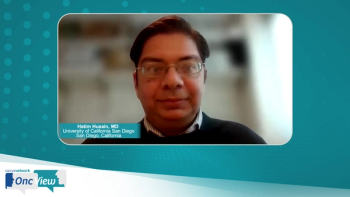
Minimal Residual Disease Testing in Early CRC
Daniel Ahn, DO, reviews MRD as a novel approach to assessing risk for recurrence and response to treatment in early stage CRC.
Episodes in this series

Kristie L. Kahl: Dr Ahn, can you explain minimal residual disease [MRD] and how is it measured?
Daniel Ahn, DO: Cell-free DNA is shed from all the cells in the body, including normal cells and tumor cells, and it can be detected from a routine blood draw. As tumor tissues undergo apoptosis and necrosis, fragments of this tumor-derived DNA are released into the bloodstream. Thus, ctDNA [circulating tumor DNA] is the proportion of tumor tissue and cell-free DNA. For a patient with solid tumors, the detection of ctDNA—following definitive therapy or surgical resection—is highly sensitive in a specific method for the identification and assessment for MRD. MRD is the evidence for any recurrence or residual malignancy in the absence of any radiographic or biochemical relapse. Recent advancements in technology have allowed for the detection of ctDNA variant illegal frequencies to be less than 0.01%.
Kristie L. Kahl: With that, how is MRD testing different from next-generation sequencing? What does each test measure?
Daniel Ahn, DO: The main difference between MRD and NGS [next-generation sequencing] is based on what it’s used for or what the platforms entail. NGS is a platform that allows for the simultaneous testing for multiple molecular targets at 1 time. NGS can be performed on either tumor tissue or blood. Following the surgical resection of a colon primary, for example, tumor tissue is sequenced using NGS where a personalized tumor-informed ctDNA assay is created for that individual patient. The purpose of this assay is to detect recurrence based on the genomic alternations that were initially identified in the patient’s tumor tissue.
Transcript edited for clarity.
Newsletter
Stay up to date on recent advances in the multidisciplinary approach to cancer.





































